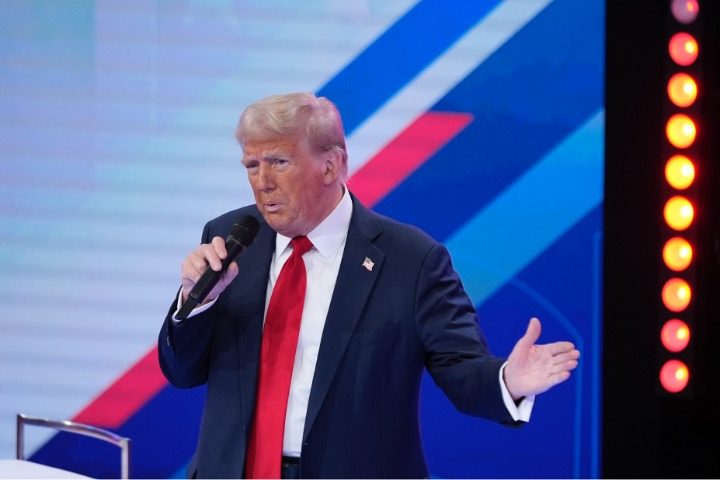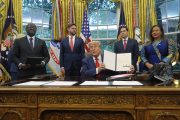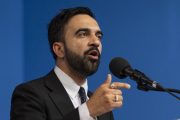
Former President Donald Trump’s latest comments suggesting that the U.S. military could be used to target “radical-left lunatics” following the 2024 presidential election have ignited a firestorm of criticism.
In an interview with Fox News on Sunday, Trump warned about the “enemy from within” and hinted at deploying the National Guard or active military forces if necessary to handle domestic threats.
Asked about the threat posed by Chinese nationals and criminal illegal immigrants on Election Day, Trump said, “I don’t think [immigrants] are the problem in terms of Election Day.” While noting that while these individuals are, indeed, “totally destroying our country,” the bigger problem is “the enemy from within.”
He clarified:
We have some very bad people, some sick people, radical-left lunatics. And it should be very easily handled by, if necessary, the National Guard or, if really necessary, by the military.
Trump’s remarks come at a time when he and many within the Republican Party have been advocating for civil discourse and urging for a reduction in divisive rhetoric, especially following the recent assassination attempts on the former president.
Backlash
Democrats, who’ve spent the past several years smearing Trump as a literal Hitler, swiftly condemned the former president.
Trump’s opponent, Vice President Kamala Harris, warned that such rhetoric undermines the principles of democracy.
During a campaign rally in Erie, Pennsylvania, on Monday, Harris denounced Trump as “increasingly unstable and unhinged.” She presented a compilation of clips from Trump’s recent rallies, as well as his Sunday interview, in which he described the “enemy from within” as the nation’s greatest threat and called for prosecuting them.
Harris’ running mate, Minnesota Governor Tim Walz, echoed the sentiment, labeling Trump’s statement a “call for violence” and “damn un-American.”
Walz warned that by “enemy from within,” Trump means “you” and any American “who does not support him.”
Democrats weren’t the only ones concerned. Former Defense Secretary Mark Esper, who served under Trump, voiced alarm, recalling Trump’s past attempts to use the military for domestic purposes. “I lived through that,” Esper said, according to The Hill. He referenced Trump’s push to deploy the National Guard in U.S. cities during the “racial justice” violent riots in 2020.
Some Republicans have also distanced themselves from Trump’s remarks. Rep. Byron Donalds (R-Fla.) said that deploying the military within U.S. borders “would not happen,” citing long-standing American legal principles.
He interpreted Trump’s words as a concern over a peaceful transition of political power after the election, adding that as long as the procedure adheres to the books, “everything will be fine.”
Trump’s spokesman Steven Cheung defended the comments in a statement to Forbes, saying,
Trump “is 100% correct — those who seek to undermine democracy by sowing chaos in our elections are a direct threat, just like the terrorist from Afghanistan that was arrested for plotting multiple attacks on Election Day within the United States.”
“The Pelosis”: Trump Doubles Down
Despite the backlash, Trump doubled down on his “enemy from within” narrative during a Fox News town hall aired Wednesday. Speaking in front of a women-only audience, he expanded on his previous remarks, this time name-checking political opponents, including former House Speaker Nancy Pelosi and Rep. Adam Schiff, both California Democrats.
“They are very dangerous,” said Trump. “They’re Marxists and communists and fascists, and they’re sick.”
As an example, Trump described how Democrats led by Rep. Schiff concocted the “Russian collusion” hoax against him.
He continued: “We have China, we have Russia, we have all these countries. If you have a smart president, they can all be handled.”
The former president then suggested that geopolitical struggles are much easier than domestic ones, taking aim at Pelosi and her ilk: “The more difficult are, you know, the Pelosis, these people; they’re so sick and they’re so evil.”
He then accused the Democrats of weaponizing the federal government against him.
“I’m not threatening anybody. They are the ones doing the threat,” he said. “They are the threat to democracy.”
Trump’s intensified rhetoric appears to serve as a calculated move in his campaign to galvanize voters in the final weeks before Election Day. Despite polling showing that Vice President Harris holds a lead among women voters, Trump is attempting to reshape the narrative, casting his political opponents as domestic threats in an effort to broaden his appeal.
Legal Framework and Responsibility
Trump’s comments have sparked renewed debate over the president’s legal authority to deploy military forces domestically. The U.S. has a complex legal structure designed to prevent the use of military power against its own citizens. The 1878 Posse Comitatus Act restricts the use of active-duty military personnel for domestic law enforcement, a principle that has been foundational to U.S. governance for over a century.
However, Trump’s supporters point to the Insurrection Act of 1807 as legal justification for potential military deployment in certain situations. The Insurrection Act allows the president to use the military in cases of insurrection or civil unrest that threaten the enforcement of U.S. laws. It has been invoked sparingly throughout history, most notably during the Civil Rights Movement and the 1992 Los Angeles riots.
The legal and political implications of Trump’s comments will likely be a point of contention as the current election cycle progresses, with both supporters and critics continuing to debate the role of the military in domestic affairs.
As political tensions escalate ahead of the election, it’s crucial that all public figures, including both former President Trump and his critics, strive to maintain a level of civility in their rhetoric. While Democrats have never shied away from strong language, this does not excuse conservatives from lowering their discourse to inflammatory accusations. Both sides must focus on policy debates rather than personal attacks or divisive narratives. In a nation founded on the principles of free speech and respectful disagreement, politicians on both sides should prioritize unity and responsible discourse over partisan escalation.





